Posts Tagged ‘Boston’
Breakstone, White & Gluck Donates 100 Bike Helmets, Partners with the Westborough Bicycle and Pedestrian Advisory Committee
Cycling safety became a fun lesson in Westborough last weekend, as 100 children learned a few basics about the road and got to take home new bike helmets.
 The Westborough Bicycle and Pedestrian Advisory Committee and attorney David White handed out the bike helmets on Saturday at the Westborough Spring Festival and the Boroughs Family Branch of the YMCA of Central Massachusetts.
The Westborough Bicycle and Pedestrian Advisory Committee and attorney David White handed out the bike helmets on Saturday at the Westborough Spring Festival and the Boroughs Family Branch of the YMCA of Central Massachusetts.
Breakstone, White & Gluck donated the helmets and will donate more at several other events in the Boston area this year. Our goal is to encourage bike helmet use to reduce the risk of head injury among children. This is the second year we have donated bike helmets to children and our first year working with the Westborough community.
“It was a pleasure to work with the Westborough Bicycle and Pedestrian Advisory Committee, the Westborough Rotary, and the Boroughs Family Branch of the YMCA of Central Massachusetts,” attorney David White said. “We were able to quickly fit 125 bicycle helmets on young kids–and an occasional parent too!”

Each year, 26,000 children and adolescents sustain traumatic brain injuries related to cycling and are treated in U.S. hospital emergency rooms. In 2010, children and teenagers under the age of 20 accounted for about half of all 515,000 bicycle-related injuries in the U.S.
The Westborough Bicycle and Pedestrian Advisory Committee’s mission is to explore ways Westborough can become safer for pedestrians and cyclists, work to develop a rail trail along an old trolley line in town and advise the Board of Selectmen on roadway safety issues and preventing bicycle accidents. In addition, the committee is working to encourage private and community investment in bike racks and signage.
Photos: Top: Bruce Tretter and members of the Westborough Bicycle and Pedestrian Advisory Committee and attorney David White of Breakstone, White & Gluck at the Westborough Spring Festival. Bottom: Attorney David White at the Boroughs Family Branch of the YMCA of Central Massachusetts.
Visit our Bike Safety Outreach page to learn more about our bike helmet donation events.
22 Years and Counting!
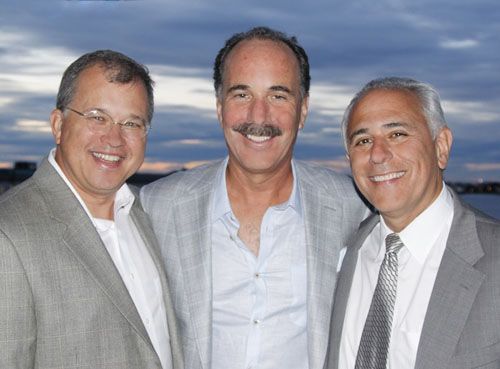
Founded in May 1992, Breakstone, White & Gluck celebrates its 22nd anniversary this week. Our law firm has been guided by a commitment to provide consistently excellent representation to individuals and families who have been seriously harmed by the negligence of others. We feel honored to help our clients not only obtain full and fair financial compensation, but also the best possible medical and personal end-results. We are grateful to the innumerable referring attorneys who have entrusted their clients’ cases to us. We are thankful to our own families for their love and support. We look forward to continuing to serve our community and our clients in the future. Thank you.
Breakstone, White & Gluck Participates in Framingham Earth Day, Donates 150 Bicycle Helmets to Children
Our attorneys partnered with the Framingham Bicycle and Pedestrian Advisory Committee to bring helmets to the community.
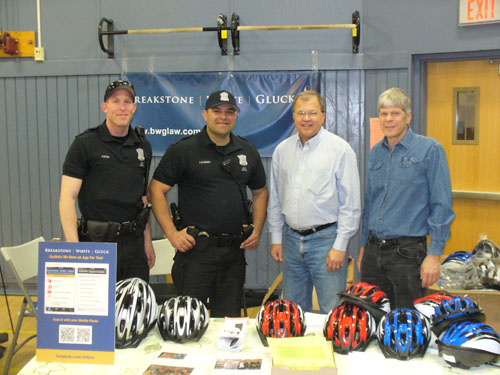
Photo from left to right: Officer Garret Coffin, Det. David Loureiro, attorney David White of Breakstone, White & Gluck, and Ed Kross, member of the Framingham Bicycle and Pedestrian Advisory Committee
Crowds packed the Framingham High School gym for the fourth annual Framingham Earth Day Festival on Saturday. There were 70 vendors offering products and services related to promoting an environmentally-friendly lifestyle. Breakstone, White & Gluck participated by donating 150 bike helmets to help children ride safely.
Breakstone, White & Gluck worked with the Framingham Bicycle and Pedestrian Advisory Committee to coordinate the donation. Attorney David White participated in the event, along with Bill Hanson, chair of the advisory committee and committee members Ed Kross, Stacy Lee and Ben Gustafson. Police Officer Garret Coffin and Detective David Loureiro of the Framingham Police Department also helped distribute the helmets.
Breakstone, White & Gluck, a Boston personal injury law firm, is donating bike helmets to children through a number of cycling organizations this year. This is the second year we have made these donations. Our goal is to provide local children access to bike helmets which properly fit to reduce the risk of head injuries.
Of all cyclists, children are most at risk for injury. According to the Centers for Disease Control and Prevention, each year, children ages 5-14 and young adults ages 15-24 have the highest rates of non-fatal bicycle related injuries. They account for 60 percent of all bike-related injuries seen in U.S. hospital emergency rooms.
We offer several cycling safety resources on our website. Visit www.bwglaw.com/project-kidsafe/ for information on a cyclist’s rights and responsibilities under Massachusetts law.
We have also written an article about how cyclists can protect themselves by purchasing extra coverage on their car insurance policy.
Boston Bikes’ Roll It Forward Program Kicks Off A New Season of Helping Children Ride Safely
The Boston Bikes’ Roll It Forward program has kicked off another season of important and fun work. On Tuesday, Roll It Forward gave away 59 refurbished bikes to children ages 5-7 who needed one. The donation was part of “Bike Day” at the West Broadway housing development in South Boston and is one of many Boston Bikes will organize this year.
Children at the housing development were asked in advance if they wanted to receive a bike. On Tuesday, they waited in line, got to choose a new bike helmet, and then were presented with a bicycle refurbished just for them. They also got to meet Boston Mayor Martin Walsh, who helped hand out bikes and played basketball with the kids.
From there, the children got to practice on an obstacle course with help from volunteers, as their parents, grandparents and friends cheered them along. There was plenty of activity for other cyclists too. Boston Bikes was selling $5 subsidized memberships for the Hubway bike share program and provided free safety inspections for 31 cyclists. Another 10 residents used the event to give back, by donating their own bikes to help Roll It Forward.
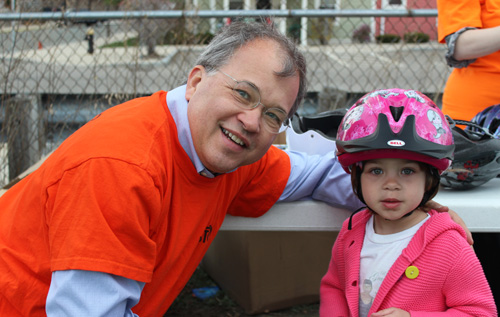
Photo: Attorney David White shown volunteering for the Boston Bikes’ Roll It Forward event on April 22, 2014. He helped children select bike helmets and made sure they properly fit.
Breakstone, White & Gluck is in its second year of supporting Boston Bikes’ Roll It Forward. This year, we are donating bike helmets for children, along with bike locks and bike lights. Cyclists are required to use bike lights if they cycle at night (defined under the law as thirty minutes after sunset until thirty minutes before sunrise).
“We are so happy to support Boston Bikes,” attorney David White said. “The program does an amazing job gathering, fixing, and giving away the bicycles. The kids know this is a special event and they really pay attention, including to when we explain the importance of always wearing a bike helmet to help prevent head injury.”
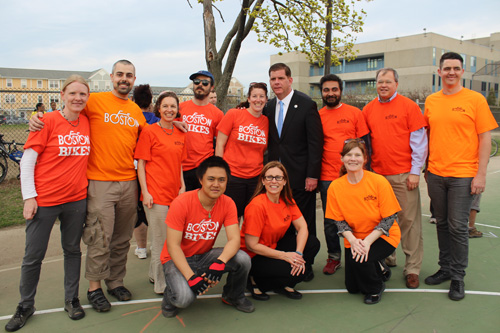 Photo: Boston Mayor Martin J. Walsh with Nicole Freedman, Director of Boston Bikes, Jenny Duquette, community programs manager, and Boston Bikes staff and volunteers, including attorney David White. April 22, 2014.
Photo: Boston Mayor Martin J. Walsh with Nicole Freedman, Director of Boston Bikes, Jenny Duquette, community programs manager, and Boston Bikes staff and volunteers, including attorney David White. April 22, 2014.
About Breakstone, White & Gluck
Breakstone, White & Gluck, a Boston personal injury law firm, is pleased to partner with Boston Bikes. Our attorneys encourage all cyclists to wear bike helmets to reduce the risk of serious head injuries while riding. According to the Centers for Disease Control and Prevention, bicyclists face a higher risk of crash-related injuries than drivers and occupants of motor vehicles. Children ages 5-14 and young adults ages 15-24 account for 60 percent of all bike-related injuries seen in U.S. hospital emergency rooms.
In 2013, we were proud to donate over 1,000 bike helmets to children in the Boston area. We are donating even more helmets this year. To learn more about our bicycle safety outreach, visit www.bwglaw.com/project-kidsafe/. We also invite you to follow our Facebook page.
Amazing Kids Learn Important Cycling Skills at iCan Shine Camp in Arlington
This blog is about a special bicycle camp that is being held in Arlington this week. Breakstone, White & Gluck was happy to donate bike helmets to support the iCan Shine Bike Camp, which fills a very important need and teaches children with disabilities how to ride bicycles. Please read about the camp, its organizer Nina Fischer and all the energetic and skilled instructors and volunteers.
This April school vacation was not a traditional break for two dozen children in Arlington. These children with disabilities spent their time off hard at work, learning how to ride bicycles at the iCan Shine Bike Camp at the Ottoson Middle School.
Children with disabilities do not have as many options for learning to ride and it is especially important in communities near Boston where cycling is so popular, said Nina Fischer, the camp’s organizer. Fischer tried to get her daughter who has cerebral palsy into bike camps for three years (including one as far away as New Jersey) before being approached to organize an iCan Shine Bike Camp locally. iCan Shine is a national non-profit organization which teaches children with disabilities how to ride bicycles. Each year, it hosts nearly 100 camps in 32 states.
Fischer said the children come ready to learn from professional instructors from the iCan Shine national organization. Add in supportive parents and volunteers who agree to guide the children on bikes five days in a row, and the combination all proves very successful.
“This is a skill they have for life,” Fischer said. “Most of these kids don’t have to come back.”
Breakstone, White & Gluck donated the bike helmets for the camp and attorney Marc Breakstone attended and got to meet the young cyclists. He said, “We are so pleased to give helmets to these courageous kids to help make sure that they ride safely.”
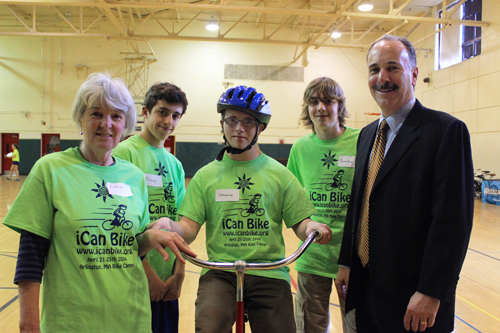
Fischer organized the first Arlington camp last year and her daughter participated. But this year, her daughter decided she had learned enough not to come back.
“That’s what is great,” Fischer said. “Once you have it, you pretty much have it down.”
But she added, “I’m totally hooked. I can’t imagine not doing it. Someone has to do it.”
According to the national organization’s website, about 80 percent of the children can successfully ride bikes independently by the end of the five-day camp. Nationwide, about 35 percent of the participants have Down Syndrome, 35 percent are on the Autism Spectrum and the rest have other diagnosis, Fischer said.
We attended on Tandem Tuesday, when the national instructors gave each child a turn riding on the front of the tandem bike. An instructor sat on the back seat to assess the child’s steering ability and strength.
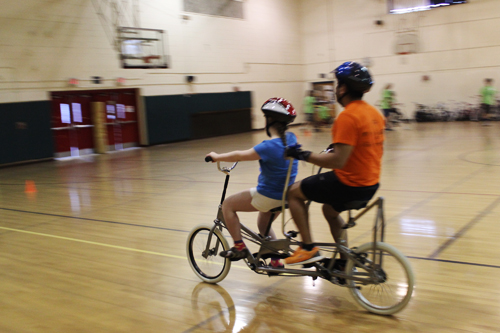
We also got to see the children make their way around the school gym with the specialized adaptive rear wheel equipment. These wheels are developed from research by Dr. Richard Klein at the University of Illinois. They are now made by his company Rainbow Trainers, Inc.
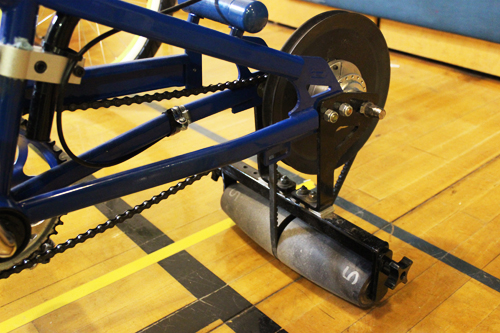
To help the children learn cycling, over the course of a few hours, the iCan Shine instructors change the strength of the bicycle rear tires up to 8 or 10 times. The children are not supposed to know about the change and are encouraged to get a cup of water or take a short break while the change happens.
While using these special rear wheels, children are riding bikes provided by the national iCan Shine organization. These bikes have no brakes. The children rely solely on their own steering and the volunteers to guide them.
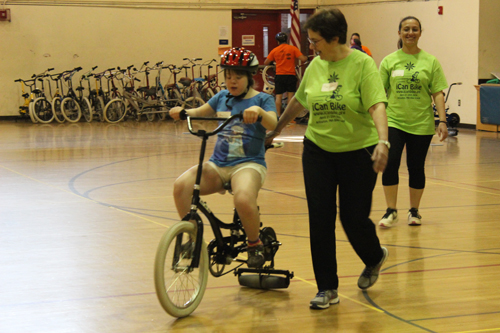
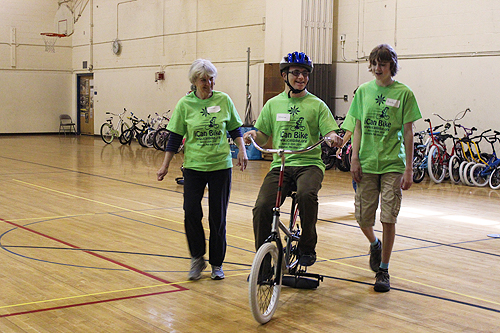
By mid-week, the children progress to two-wheel bikes with brakes. Later in the week, the instructors will start to work with Belmont Wheelworks and the children’s parents on ordering bikes which will best suit each child. They then take the bikes to the gym to practice with the iCan Shine instructors.
“Sometimes that transition is difficult, rocky,” said Andrea Patrick, floor supervisor for the national iCan Shine program. “That’s why we try to do it at camp, where they have learned the skills and it is a safe environment.”
About Breakstone, White & Gluck
Breakstone, White & Gluck, a Boston personal injury law firm, encourages all cyclists to wear bike helmets to reduce the risk of serious head injuries while riding.
According to the Centers for Disease Control and Prevention, bicyclists face a higher risk of crash-related injuries than drivers and occupants of motor vehicles. Children ages 5-14 and young adults ages 15-24 have the highest rates of non-fatal bicycle related injuries and account for 60 percent of all bike-related injuries seen in U.S. hospital emergency rooms.
In 2013, we were proud to donate over 1,000 bike helmets to children in the Boston area. We are donating more helmets this year. To learn more about our bicycle safety outreach, visit www.bwglaw.com/project-kidsafe/. We also invite you to follow our Facebook page.
Fourth Season Begins for Boston’s Hubway Bike Share Program
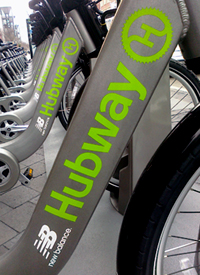 Hubway, Boston’s popular bike share program, launched its fourth season earlier this month. Four years shows a lot of ground covered for the program.
Hubway, Boston’s popular bike share program, launched its fourth season earlier this month. Four years shows a lot of ground covered for the program.
Hubway was launched on July 28, 2011, as a partnership between the City of Boston and Alta Bicycle Share, with 600 bikes at 60 rental stations. The program has been a big success and this season, riders will share 1,300 bikes at 140 bike rental stations in Boston, Cambridge, Somerville and Brookline. The program hit the 1,500,000-rider mark last Thanksgiving, then closed out 2013 with nearly 10,000 annual subscribers (and that’s not counting the short-term memberships).
In the past, Boston split both operating costs and profits with Alta Bicycle Share. Boston paid for its share using private sponsorships and public grant money.
But Boston is now venturing out on its own. Under a new contract, Boston will fund all operating costs and pay Alta Bicycle Share for services. The city will buy all services for a lower rate, about 30 percent less. For each bike dock, this translates into about $70 per month for maintenance and operations. This is lower than other U.S. programs, such as the Capital Bikeshare in Washington D.C., which pays $111 per bike dock.
This is good news and comes at a time when other cities are struggling to pay the bills for their bike shares. Montreal’s bike-share program filed for bankruptcy in January and New York City’s bike program recently asked officials for millions of dollars in aid.
In addition to seeking public grants and private sponsorship, Boston has kept costs down by closing bike racks for the winter. However, this past winter, Cambridge sites were kept open as a pilot test program.
What is new with Hubway this season:
Cambridge. The city kept Hubway racks open throughout this winter, as part of a pilot program. The system saw an average of 2,000 Hubway trips per week, with no injuries or incidents reported. Six new stations are expected to open this season.
Boston. Ten new Hubway stations are expected in Jamaica Plain and Dorchester this year.
Boston bike helmets. The program asks all riders to agree to wear helmets in their rental contract and has partnered with city businesses to offer subsidized helmets in the past. Last fall, it tested the first bike helmet vending machine in Back Bay, on the corners of Boylston and Massachusetts Avenue. The vending machine holds three dozen helmets and accepts returns.
Bike helmets are required for cyclists age 16 and under in Massachusetts. In addition to requiring use for Hubway cyclists, Boston city officials have discussed the possibility of passing a local law mandating use by all cyclists to protect riders from the risk of long-term head injuries in bicycle accidents.
Brookline. The city will re-open the same four stations in Coolidge Corner, Washington Square and Brookline Village.
Somerville. Somerville will open 12 stations this year. One change is the Ball Square station will be moved to Magoun Square.
Read More
Toyota, GM and Mazda Make New Headlines for Safety Recalls
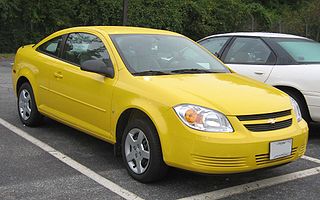 Toyota issues its second largest safety recall ever while GM CEO addresses Congress and Mazda reports a new web of problems
Toyota issues its second largest safety recall ever while GM CEO addresses Congress and Mazda reports a new web of problems
Toyota has more bad news for drivers. Just a few weeks ago, Toyota agreed to pay a record $1.2 billion criminal penalty to the federal government. The Japanese automaker, which has recalled over 9 million vehicles worldwide in recent years, recalled another 6.4 million vehicles on Wednesday for steering, airbag and other safety defects. This is the company’s second largest single recall announcement. Toyota states that it is not aware of any crashes or injuries involving these defects.
In March, Toyota agreed to pay the $1.2 billion criminal penalty to federal government for misleading consumers and the government about unintended acceleration in its cars and trucks. The Justice Department had charged Toyota with wire fraud, but agreed to defer the criminal charge for three years while the company submits to government monitoring.
This week’s recalls involve 27 Toyota models, including the RAV4 and Yaris. The largest recall involves 3.5 million vehicles which have defective spiral cables that can be damaged when the steering wheel is turned. Other defects involve a seat rail that can be pushed forward in a crash, as well as faulty steering column brackets, windshield wiper motors and engine starters.
GM ignition defects draw Congressional inquiry. Last week, General Motors CEO Mary Barra was questioned by Congress about faulty ignition switches in GM vehicles, and about her company’s slow response to protecting the public after learning about at least 13 deaths linked to the defect. GM has recalled over 2.5 million vehicles which may be equipped with the faulty ignition switch.
A week later, the National Highway Traffic Safety Administration (NHTSA) is waiting on more answers from General Motors. It reports the company has failed to respond to more than a third of its written questions. The company is being fined $7,000 each day for failing to fully respond, and the NHTSA is expected to hand the matter over to the Justice Department shortly.
Spiders and hoses and gas, oh my! Mazda also issued a recall this week, one involving an unusual, but familiar safety problem. For the second time in three years, Mazda has recalled 42,000 Mazda6 sedans. This recall involved vehicles from 2010, 2011 and 2012.
The problem is the yellow sac spider. The spiders are attracted to the smell of gasoline and can weave a web in the evaporative fuel hose, causing pressure to build up in the fuel tank. Too much pressure can cause fuel tank cracks, leaks and fires.
In 2011, Mazda had recalled 65,000 Mazda6s from 2009 and 2010 for this defect. The car manufacturer attempted to remedy the defect by installing a spring inside the vehicle’s fuel line, but recently reported nine cases in which this was not adequate. The company is not aware of any fires due to the defect, but will now notify car owners. The remedy requires checking of the evaporative canister vent line and software reprogramming.
Read More
Attorney David White Receives Volunteer of the Year Award from Boston Bikes
Attorney David White was recognized for his contributions to Boston’s cycling community at last night’s 6th Annual Boston Bike Update, which was held in the historic Faneuil Hall in Boston.
White, an attorney at Breakstone, White & Gluck, received the Volunteer of the Year award from Boston Bikes, the city office which oversees the growth of safety infrastructure, the Hubway bike share facilities, and programs for youth and low-income residents. White was honored alongside Bikes Not Bombs of Jamaica Plain, which received the Organization of the Year award. Jon Ramos was named Rookie Advocate of the Year and Vineet Gupta was Unsung Hero of the Year.
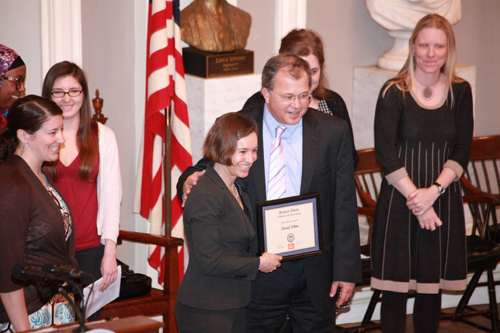
Photo credit: LivableStreets/www.livablestreets.info. Attorney David W. White of Breakstone, White & Gluck and Nicole Freedman, Director of Boston Bikes, during the 6th Annual Boston Bike Update at Faneuil Hall.
Jenny Duquette, Community Cycling Program Manager, introduced White:
“Our Volunteer of the Year is a former president of the Massachusetts Bar Association and a trial lawyer at Breakstone, White, & Gluck, which donated 160 helmets to Roll It Forward in 2013.”
“Like any superstar volunteer, he wanted to have an impact, so last year he volunteered at several bike giveaways as our helmet station guru – getting the kids excited about their new helmets, while making sure they got a helmet that actually fit! This year, his firm is donating helmets, locks, and light sets.”
Boston Bikes and Roll It Forward
Roll It Forward collects, repairs and distributes bikes to low-income Boston residents who might not otherwise have access to one. The program’s goal is to promote a healthier lifestyle with increased physical activity and fewer trips by car. As of January 2014, the program had distributed 2,728 bicycles. It plans to donate 850 more in 2014. In one very busy two-year period, the city’s youth cycling program gave safety classes to over 7,770 youth.
Former Mayor Thomas Menino established Boston Bikes in 2007 by hiring transportation planner and former Olympic cyclist Nicole Freedman. At that time, Boston only had 60 yards of bike lanes and was frequently cited as the worst city in the country for cyclists.
Today, the city has 60 miles of bike lanes. Boston Bikes is working to expand the network by adding a variety of new bike lanes, including new cycletracks, which will put a barrier between bike lanes and cars. The Hubway program, which launched in July 2011, continues to grow with more bike stations in Boston as well as Cambridge, Somerville and Brookline. And the program strongly encourages use of helmets, by asking riders to agree to wear helmets in the Hubway contracts, partnering with businesses to offer subsidized helmets and opening the first-in-the-nation helmet vending machine in Back Bay.
Related:
Watch the Boston Bike Update.
Read more about Boston Bikes.
View Facebook photos of the 6th Annual Boston Bike Update.
Read More
Will Toyota Criminal Penalty Improve Safety?
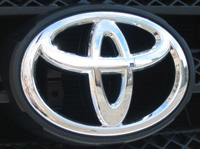 Toyota agreed last week to pay a record $1.2 billion criminal penalty for misleading consumers and the government about unintended acceleration in its vehicles. This safety defect and others have resulted in numerous injuries and deaths. Over 10 million Toyota vehicles have been recalled so far.
Toyota agreed last week to pay a record $1.2 billion criminal penalty for misleading consumers and the government about unintended acceleration in its vehicles. This safety defect and others have resulted in numerous injuries and deaths. Over 10 million Toyota vehicles have been recalled so far.
This is the largest criminal penalty ever imposed on a car manufacturer. As part of the agreement, the Justice Department charged Toyota with wire fraud but deferred the criminal charge for three years while the company submits to government monitoring.
We have been reading about Toyota’s safety defects for many years now, along with the more important violation of trust: the Japanese automaker repeatedly failed to warn the public about safety problems. CNN reported last week that the company “at one point boasted internally about saving $100 million in costs by avoiding a full safety recall.”
To date, Toyota has paid out more than $66 million in fines for not immediately reporting defects. Several of these fines have been record-breaking. In 2010, the National Highway Traffic Safety Administration fined the company a record $16 million for its delayed response in notifying the government about defects. In 2012, the NHTSA fined the company an additional $17.4 million.
The company has faced numerous injury and wrongful death lawsuits. In addition to sticky pedals and unintended acceleration, unsecured floor mats and other equipment have caused safety hazards. Last October, an Oklahoma jury decided that defective electronics were to blame for a car accident which killed a woman and seriously injured another person. Toyota was ordered to pay $3 million in damages.
As for Toyota, U.S. Attorney General Eric Holder told the Detroit Press: “Put simply, Toyota’s conduct was shameful. It showed a blatant disregard for systems and laws designed to look after the safety of consumers. By the company’s own admission it protected its brand ahead of its own consumers.”
Still, consumers have continued to buy Toyota. The company was the top-selling automaker in 2012 and 2013, selling 9.98 million vehicles in 2013.
Related:
Toyota to pay $1.2 billion in settlement with U.S. over recalls, CNN.
Read More
Massachusetts Court Judgment is Tragic Reminder About the Social Host Liability Law
A Massachusetts court judgment this week is a tragic reminder of what can happen when teens drink and drive and social host liability laws are ignored.
On Monday, 23-year-old Craig Snow was ordered to pay $1 million each to the parents of Julia Gauthier. In 2010, 19-year-old Gauthier, a freshmen at Salem State College, was killed in a car accident in Lynn when her boyfriend Christopher Maxson rolled the SUV he was driving. She and Maxson had just left a party hosted by Snow, who had provided the alcohol that night. Maxson pled guilty to motor vehicle homicide while driving drunk in December 2010.
Snow was charged criminally under Massachusetts’ social host liability law, but avoided jail time. Gauthier’s family also filed a civil lawsuit against him, resulting in this week’s judgment.
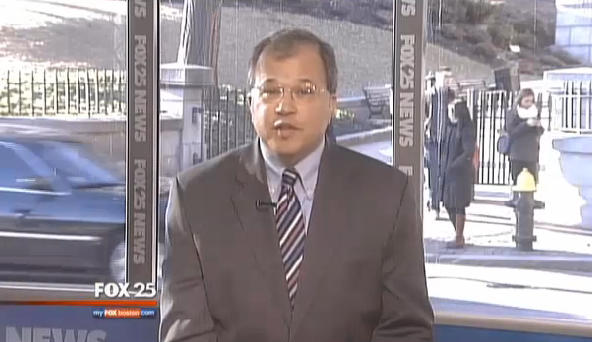
“The question here is reasonableness and you should not furnish so much alcohol to any guest that you have that they leave your house inebriated,” attorney David White said in a television interview this week with FOX 25 News Boston.
White added, “It’s a real strong reminder to parents as the graduation season approaches to take extra care to make sure their children aren’t driving drunk.”
Watch the Fox 25 News Boston interview.
Read more about the social host liability law on our website.
Read More

